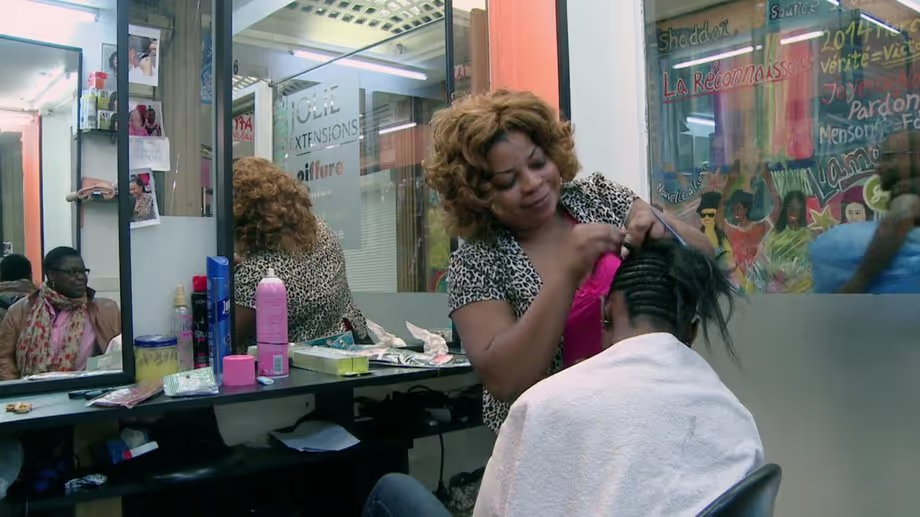Chez Jolie Coiffure Delve Deeper Reading List
Adult Fiction

In this captivating documentary filmed in a single tiny room, viewers step inside an underground hair salon with its charismatic proprietor, a Cameroonian immigrant named Sabine. Here, she and her employees style extensions and glue on lashes while watching soaps, dishing romantic advice, sharing rumors about government programs to legalize migrants, and talking about life back home in Cameroon.
Adichie, Chimamanda Ngozi. Americanah. Anchor, 2013.
Ifemelu and Obinze are young and in love when they depart military-ruled Nigeria for the West. Beautiful, self-assured Ifemelu heads for America, where despite her academic success, she is forced to grapple with what it means to be black for the first time. Quiet, thoughtful Obinze had hoped to join her, but with post-9/11 America closed to him, he instead plunges into a dangerous, undocumented life in London. Fifteen years later, they reunite in a newly democratic Nigeria, and reignite their passion—for each other and for their homeland. The novel begins in a flashback when Ifemelu is having her hair braided—the imbued symbolism of hair is a key element in the book. And as a personal expression of identity it’s something every reader, and certainly every woman, can relate to personally.
Bulawayo, NoViolet. We Need New Names. Back Bay Books, 2014.
Darling is only ten years old, and yet she must navigate a fragile and violent world. In Zimbabwe, Darling and her friends steal guavas, try to get the baby out of young Chipo’s belly, and grasp at memories of Before. Before their homes were destroyed by paramilitary policemen, before the school closed, before the fathers left for dangerous jobs abroad. But Darling has a chance to escape: she has an aunt in America. She travels to this new land in search of America’s famous abundance only to find that her options as an immigrant are perilously few.
Busby, Margaret (Editor). New Daughters of Africa: An international anthology of writing by women of African descent.Amistad Press, 2019.
This follow-up to the original landmark anthology brings together fresh and vibrant voices that have emerged from across the globe in the past two decades, from Antigua to Zimbabwe and Angola to the United States. Key figures, including Margo Jefferson, Nawal El Saadawi, Edwidge Danticat, and Zadie Smith, join popular contemporaries such as Chimamanda Ngozi Adichie, Imbolo Mbue, Yrsa Daley-Ward, Taiye Selasi, and Chinelo Okparanta in celebrating the heritage that unites them. Each of the pieces in this remarkable collection demonstrates an uplifting sense of sisterhood, honors the strong links that endure from generation to generation, and addresses the common obstacles female writers of color face as they negotiate issues of race, gender, and class and address vital matters of independence, freedom, and oppression.
Gyasi, Yaa. Homegoing. Vintage, 2017.
Ghana, eighteenth century: two half-sisters are born into different villages, each unaware of the other. One will marry an Englishman and lead a life of comfort in the palatial rooms of the Cape Coast Castle. The other will be captured in a raid on her village, imprisoned in the very same castle, and sold into slavery. Homegoing follows the parallel paths of these sisters and their descendants through eight generations: from the Gold Coast to the plantations of Mississippi, from the American Civil War to Jazz Age Harlem. The novel casts light upon slavery’s troubled legacy both for those who were taken and those who stayed—and shows how the memory of captivity has been inscribed on the soul of our nation.Ghana, eighteenth century: two half sisters are born into different villages, each unaware of the other. One will marry an Englishman and lead a life of comfort in the palatial rooms of the Cape Coast Castle. The other will be captured in a raid on her village, imprisoned in the very same castle, and sold into slavery.
Selasi,Taiye. Ghana Must Go by.Penguin, 2014.
This novel takes readers from Accra to Lagos to London to New York, it is at once a portrait of a modern family and an exploration of the importance of where we come from to who we are.
A renowned surgeon and failed husband, Kweku Sai dies suddenly at dawn outside his home in suburban Accra. The news of his death sends a ripple around the world, bringing together the family he abandoned years before. Moving with great elegance through time and place, Ghana Must Go charts their circuitous journey to one another and, along the way, teaches us that the truths we speak can heal the wounds we hide.
Smith, Zadie. Swing Time: A NovelPenguin Books, 2017.
An ambitious, exuberant new novel moving from North West London to West Africa.
Two brown girls dream of being dancers—but only one, Tracey, has talent. The other has ideas: about rhythm and time, about black bodies and black music, what constitutes a tribe, or makes a person truly free. It’s a close but complicated childhood friendship that ends abruptly in their early twenties, never to be revisited, but never quite forgotten, either. The story moves from London to West Africa, where diaspora tourists travel back in time to find their roots, young men risk their lives to escape into a different future, the women dance just like Tracey—the same twists, the same shakes—and the origins of a profound inequality are not a matter of distant history, but a present dance to the music of time.
